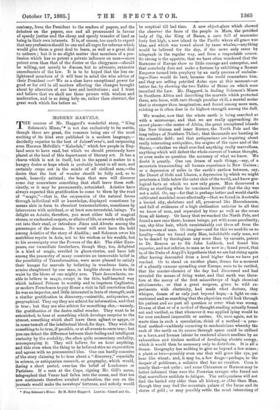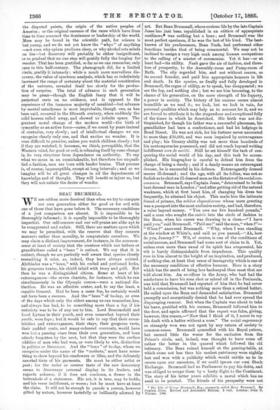MODERN MARVELS.
THE success of Mr. Haggard's wonderful story, "King Solomon's Mines," is not due exclusively to its merits, though these are great, the romance being one of the most exciting of its kind ever published in a modern language,— decidedly superior to the beet of JalesaVerne's, and surpassing even Herman Melville's " Kaloolah," which few people in Eng- land seem to have read, but which we should previously have placed at the head of this department of literary art. It has a charm which is not in itself, but in the appeal it makes to a hungry desire or hope which is probably latent in all men, and certainly crops out in the minds of all civilised men,—the desire that the lust of wonder should be fully and, so to speak, honestly satiated ; the hope that men will discover some day somewhere something that shall leave them suffi- ciently, or it may be permanently, astonished. Asiatics have always expected this gratification to come to them by the road of "magic,"—that is, the suspension of the natural forces through individual will or knowledge, displayed sometimes by means akin in form to chemical transmutations, sometimes by intercourse with spiritual, or at least non-terrestrial, beings. To delight an Asiatic, therefore, you must either talk of magical stones, or enchanted carpets, or elixirs of life, or swords with spells cut into their steel, or introduce Jinns and Afreets among the personages of the drama. No novel will ever have the hold among Asiatics of the story of Aladdin ; and Solomon owes his matchless repute in Asia, not to his wisdom or his wealth, but to his sovereignty over the Powers of the Air. The elder Euro- peans, our immediate forefathers, though they, too, delighted in a kind of magic, revelled in ghost-stories, and have left among the peasantry of many countries an immovable belief in the possibility of Transformation, were more pleased to satisfy their hunger for marvels by believing in wondrous feats, in armies slaughtered by one man, in knights cloven down to the waist by the blows of one mighty arm. Their descendants, un- able to believe in magic, except in the thin, half-hearted way which induced Princes to worship and to imprison Cagliostro, or modern Frenchmen to pay Home a visit in fall conviction that he was an impostor, and little interested in feats of strength, seek a similar gratification in discovery,—scientific, antiquarian, or geographical. They say they are athirst for information, and that is true ; but they are also athirst for something else,—namely, the gratification of the desire called wonder. They want to be astonished, to hear of something which develops surprise to the utmost, something which shall leave them aghast or agape, or in some tumult of the intellectual blood, for days. They wish the something to be true, if possible, or at all events to seem true ; but you can detect the difference between their feeling and intelligent curiosity by the credulity, the often quite momentary credulity, accompanying it. They will believe for an hour anything, and this even when the thing to be believed stirs no superstition and agrees with no preconceived idea. One can hardly conceive of the story claiming to ba true about a "discovery," especially in science, or antiquarian research, or geography, which would, during a short period, over-tax the belief of Londoners or Parisians. If a man at the Cape, signing Mr. Gill's name, telegraphed that Venus had fallen into the ocean, and that ten new continents therefore awaited exploration, the run on the journals would make the newsboys' fortunes, and nobody would • Xing Solomon's Mines. By H. Rider Haggard. London : Cassell and Co.
be sceptical till bed time. A new object-glass which showed the observer the faces of the people in Mars, the petrified body of Og, the King of Basan, a save full of mummies forty feet high, a new island in the Pacific where all grass was blue, and which was towed about by tame whales,—anything would be believed for the day, if the news only came by telegraph in the regular way, and from a respectable source. So strong is the appetite, that we have often wondered that the Barnums of Europe show so little courage and enterprise, and that somebody does not make a fortune by exhibiting a Roman Emperor turned into porphyry by an early process of embalm- ing—Nero would do best, because the world remembers him, and they are selling petrified Aztec eyes at this moment—or better far, by showing the two Tables of Stone on which were inscribed the Law. Mr. Haggard, in finding Solomon's Mince in Southern Africa and describing the marvels which protected them, sets loose, with rare though peculiar skill, a mental motor that is stronger than imagination, and found among more men, existing as it often does in its highest strength among the dull.
We wonder, now that the whole earth is being searched as with a microscope, and that we are really approaching its secret places—the centre of Africa, the great unexplored islands like New Guinea and inner Borneo, the North Pole and the long valleys of Northern Thibet ; that thousands are hunting in the scientific field ; and that antiquarians are inquiring about really interesting antiquities, the origins of the races and of the States, —whether we shall ever find anything really marvellous, anything which will deflect the whole current of human thought, or even make us question the accuracy of what we know. We doubt it greatly. One can dream of such things,—say, of a mountain transcending all human experience in New Guinea ; or a depression of miles in the earth's surface between, say, the Desert of Gobi and Lhassa, a depression by which we might penetrate a little below the outer skin of the world, and know geo- logical facts at which we now only guess. Man discovered a thing as startling when he convinced himself that the sky was not a solid. Or, say—for that is perhaps better and would startle cultivated mankind more effectually—that we found in Australia a buried city, skeletons and all, preserved like Herculaneum, and full of evidences of a high civilisation anterior to all that we know of men, and separated by time as well as the ocean from all history. Or fancy that we reached the North Pole, and found a new race there, human beings, yet with some peculiarity, say, sky-blue hair, which unmistakably cut them off from the known races of man. Or imagine—and for this we need fix on no locality—that we found early Man, indubitable early man, not to be denied by theologians any more than by savants, patent to Dr. Benson as to Sir John Lubbock, and found him superior, and not inferior, to man as he now is ; found proof, that is, of the Duke of Argyll's hypothesis that we are but rising again after having descended from a level higher than we have yet reached. Or to stand on another plane, dream for a moment of a ghastly rumour spreading over Europe, soon to be verified, that the master-chemist of the day had discovered and bad revealed the means of firing water, and that earth was there- fore at the mercy of the first misanthrope of high chemical attainments ; or that a great surgeon, given to wild ex- periments with electricity, had made what doctors, they whisper, dream of as only just beyond hope,—a light so con- centrated and so searching that the physician could look through his patient and see past all question or error what was wrong. Dream of that or of a method of thought-reading actually found out and verified, so that whenever it was applied lying would be for ever rendered impossible or useless. Or, once again, not to waste time in such a speculation, think of a method—a prac- tical method—suddenly occurring to mechanicians whereby the rush of the earth on its course through space could be utilised as a force, and human labour be rendered almost needless by an exhaustless and tireless method of developing electric energy, which it would then be necessary only to distribute. It is all a dream. Geography has nothing to give us beyond a few mines ; a plant or two—possibly even one that will grow like rye, yet bear like wheat ; and, it may be, a few drugs—perhaps, to the despair of publicans, a sedative that has no reaction. Coca is nearly that—not quite ; and some Chinamen or Bornese may be better informed than were the Peruvian savages who found out that marvellous antidote to fatigue. The antiquarians will not find the buried city older than all history, or older than Man, though they may find the mountain palace of the Incas and its stores of gold ; or may possibly settle the most interesting of
the disputed points, the origin of the native peoples of America ; or the original oneness of the races which have from time to time assumed the dominance or leadership of the world. More may be found in the scientific path, for science is but young i and we do not yet know the " whys " of anything —not even why opium produces sleep, or why alcohol sets minds on fire—but discovery will probably be either insignificant, or so gradual that no one step will gratify fully the longing for- wonder. That has been gratified, so far as we can remember, only once in this half-century. The phonograph did, for a limited circle, gratify it intensely; while a much more marvellous dis- covery, the value of spectrum analysis, which has so indefinitely increased the range of certainty about the material constitution of the universe, revealed itself too slowly for the produc- tion of surprise. The total of advance in each generation may be great—though the English fancy that it will be perpetual rests on no evidence, and is opposed to the experience of the immense majority of mankind—but advance by mental cataclysms is most improbable, though one, as has been said, occurred in the fifteenth century, when suddenly the solid heaven rolled away, and showed us infinite space. The greatest moral" change of the modern world—the birth of sympathy as an active force—came, if we count by years instead of centuries, very slowly ; and of intellectual changes we can recognise clearly only one, and that excites no wonder. It is even difficult to perceive, unless you watch children closely ; but if they are watched, it becomes, we think, perceptible, that the Western mind, for good or evil, is releasing itself by some change in. its very structure from dependance on authority. To say what we mean in an unmistakeable, but therefore too unquali- fied a fashion-, men are born with harder brains. That process is, of course, imperceptible, except at long intervals ; and so we imagine will be all great changes in aU the departments of knowledge and of thought. They will benefit or injure us, but they will not satiate the desire of wonder.



































 Previous page
Previous page